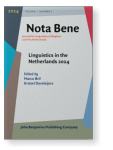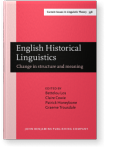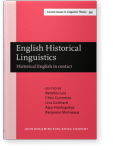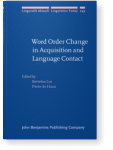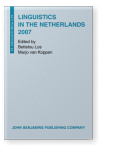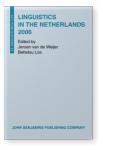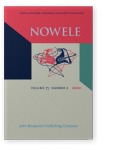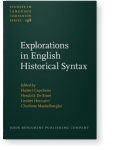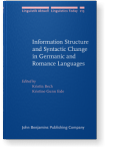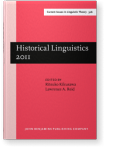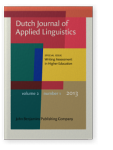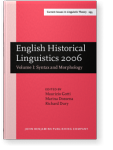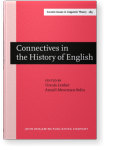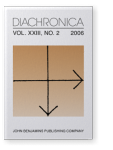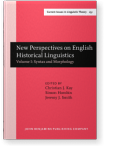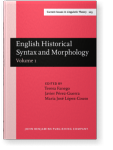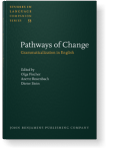Bettelou Los
List of John Benjamins publications for which Bettelou Los plays a role.
Journal
English Historical Linguistics: Change in structure and meaning. Papers from the XXth ICEHL
Edited by Bettelou Los, Claire Cowie, Patrick Honeybone and Graeme Trousdale
[Current Issues in Linguistic Theory, 358] 2022. viii, 349 pp.
Subjects English linguistics | Germanic linguistics | Historical linguistics
English Historical Linguistics: Historical English in contact. Papers from the XXth ICEHL
Edited by Bettelou Los, Chris Cummins, Lisa Gotthard, Alpo Honkapohja and Benjamin Molineaux
[Current Issues in Linguistic Theory, 359] 2022. vi, 185 pp.
Subjects English linguistics | Germanic linguistics | Historical linguistics
Word Order Change in Acquisition and Language Contact: Essays in honour of Ans van Kemenade
Edited by Bettelou Los and Pieter de Haan
[Linguistik Aktuell/Linguistics Today, 243] 2017. ix, 376 pp.
Subjects Historical linguistics | Syntax | Theoretical linguistics
Linguistics in the Netherlands 2007
Edited by Bettelou Los and Marjo van Koppen
[Linguistics in the Netherlands, 24] 2007. viii, 247 pp.
Subjects Theoretical linguistics
Linguistics in the Netherlands 2006
Edited by Jeroen van de Weijer and Bettelou Los
[Linguistics in the Netherlands, 23] 2006. viii, 248 pp.
Subjects Theoretical linguistics
2022 Introduction: English Historical Linguistics at 20 ICEHLs English Historical Linguistics: Change in structure and meaning, Los, Bettelou, Claire Cowie, Patrick Honeybone and Graeme Trousdale (eds.), pp. 1–12 | Chapter
2022 Incipient articles in Old East Scandinavian varieties NOWELE 75:2, pp. 160–193 | Article
This is a study of the semantics of definiteness marking and of its applicability to the Old East Scandinavian linguistic scenario. Contrary to the Modern Continental Scandinavian languages, Old East Scandinavian varieties did not possess fully-fledged definite articles, although all three… read more
2018 Chapter 1. “Permissive” subjects and the decline of adverbial linking in the history of English Explorations in English Historical Syntax, Cuyckens, Hubert, Hendrik De Smet, Liesbet Heyvaert and Charlotte Maekelberghe (eds.), pp. 23–50 | Chapter
Earlier work by Los and Dreschler (2012) and Komen et al. (2014) offered quantitative evidence of a decline in clause-initial adverbials as discourse linkers in the history of English, and argued that subjects have taken over much of the function of discourse linking that was earlier performed by… read more
2017 Chapter 1. Introduction Word Order Change in Acquisition and Language Contact: Essays in honour of Ans van Kemenade, Los, Bettelou and Pieter de Haan (eds.), pp. 1–5 | Chapter
2017 Chapter 12. Verb particle combinations and word order change in Dutch-lexifier creole languages Word Order Change in Acquisition and Language Contact: Essays in honour of Ans van Kemenade, Los, Bettelou and Pieter de Haan (eds.), pp. 265–290 | Chapter
This paper discusses the development and structural properties of verb + particle combinations in various creole languages for which Dutch was the main lexifier: Afrikaans, Berbice Dutch Creole, and Virgin Islands Dutch Creole (Negerhollands). In addition, it examines creole languages which have… read more
2017 Chapter 9. Beowulf and Old English metre: Relics of a pre-V2 state? Word Order Change in Acquisition and Language Contact: Essays in honour of Ans van Kemenade, Los, Bettelou and Pieter de Haan (eds.), pp. 187–212 | Chapter
This chapter builds on various suggestions in the literature that the syntax of the Old English poem Beowulf is constrained by its metre, an inheritance from Common Germanic. The differences are particularly evident in the position of the finite verb. An inventory of how clauses map into the a–… read more
2014 Quantifying information structure change in English Information Structure and Syntactic Change in Germanic and Romance Languages, Bech, Kristin and Kristine Gunn Eide (eds.), pp. 81–110 | Article
The verb-second constraint in Old and Middle English made available a special clause-initial position that could host more than just the subject. Los (2009) suggests that this position served a discourse-linking function, expressed by, for instance, an adverbial. This allowed the subject to be… read more
2013 Recycling “junk”: A case for exaptation as a response to breakdown Historical Linguistics 2011: Selected papers from the 20th International Conference on Historical Linguistics, Osaka, 25-30 July 2011, Kikusawa, Ritsuko and Lawrence A. Reid (eds.), pp. 267–288 | Article
First language learners are “morphology machines,” but second language learners are not. This phenomenon is at the heart of those cases of exaptation (in the sense of Lass 1990) where a loss in morphology due to language contact (second language acquisition) triggers new interpretations of… read more
2013 Information Structure: The final hurdle? The development of syntactic structures in (very) advanced Dutch EFL writing Writing Assessment in Higher Education, Weltens, Bert, Jos Hornikx, Wander Lowie, Petra Poelmans and Rebecca L. Present-Thomas (eds.), pp. 92–107 | Article
Although texts produced by (very) advanced Dutch learners of English as a foreign language (EFL) may be perfectly grammatical, they often feel distinctly non-native. Dutch, as a verb-second language, makes separate positions available for discourse linking and aboutness-topics. Although the… read more
2008 Particles as grammaticalized complex predicates English Historical Linguistics 2006: Selected papers from the fourteenth International Conference on English Historical Linguistics (ICEHL 14), Bergamo, 21–25 August 2006, Gotti, Maurizio, Marina Dossena and Richard Dury (eds.), pp. 157–179 | Article
This paper argues that English phrasal verbs represent a grammaticalization, from Phrase to Head, of a complex predicate construction. Predicates and the particles of phrasal verbs share a number of striking quirks: syntactically, both may appear with “unselected objects” and, semantically, both… read more
2007
To as a connective in the history of English
Connectives in the History of English, Lenker, Ursula and Anneli Meurman-Solin (eds.), pp. 31–60 | Article2006 Review of van Gelderen (2004): Grammaticalization as Economy Diachronica 23:2, pp. 440–447 | Review
2004 From resultative predicate to event-modifier: The case of forth and on New Perspectives on English Historical Linguistics: Selected papers from 12 ICEHL, Glasgow, 21–26 August 2002, Kay, Christian, Simon Horobin and Jeremy J. Smith (eds.), pp. 83–102 | Article
2002 The loss of the indefinite pronoun man: Syntactic change and information structure English Historical Syntax and Morphology: Selected papers from 11 ICEHL, Santiago de Compostela, 7–11 September 2000, Fanego, Teresa, Javier Pérez-Guerra and María José López-Couso (eds.), pp. 181–202 | Article
2000 Onginnan/beginnan with bare and to-infinitive in Ælfric Pathways of Change: Grammaticalization in English, Fischer, Olga, Anette Rosenbach and Dieter Stein (eds.), pp. 251–274 | Article
